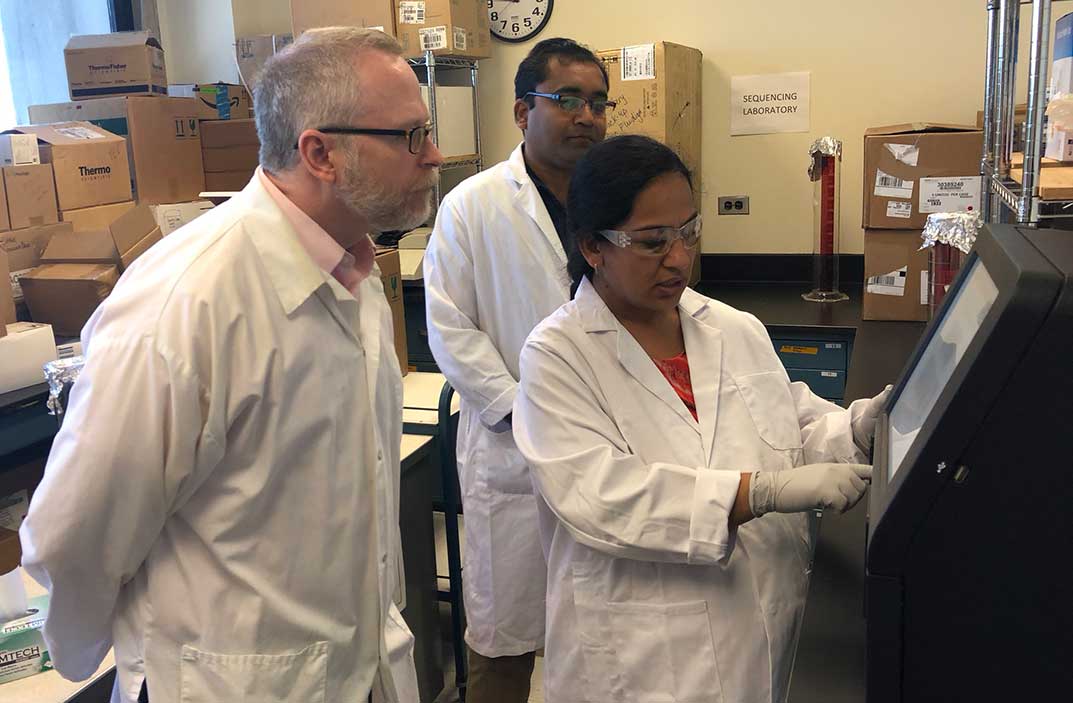Meet Poonam Sharma, Ph.D.
By 2050, drug resistant infections will kill more than 10 million people worldwide, according to estimates from the Public Library of Science.

Poonam Sharma, Ph.D., (right) confers with fellow participant, Sushim Gupta, Ph.D., (middle) and her mentor, research microbiologist, Jonathon Frye, Ph.D., (left). Sharma investigated antibiotic resistance mechanisms in food borne pathogens while a participant in the U.S. Department of Agriculture Agricultural Research Service Research Participation Program.
Poonam Sharma, Ph.D., received her doctoral degree in bacterial genomics because she wanted to find solutions to this problem. She researched antibiotic resistant bacteria and then changed her focus to food pathogens.
Antibiotic resistance (AR) refers to the ability of a bacteria to resist the effects of medication that in the past was effective in treating or preventing an infection.
Fortunately, the U.S. Department of Agriculture (USDA) Agricultural Research Service (ARS) Research Participation Program afforded Sharma the chance to increase her knowledge in AR and food pathogens.
The USDA ARS Research Participation Program provides opportunities for students, postgraduates, established scientists and faculty to participate in programs, projects and activities at ARS-designated facilities to help ARS solve agricultural problems of high national priority.
Along with her mentor, research microbiologist Charlene Jackson, Ph.D., at the Bacterial Epidemiology and Antimicrobial Resistance Research Unit (BEARRU), Sharma focused on the genome sequencing and sequence analysis of food borne pathogens. This research helped her understand the mechanisms of AR and the factors associated with the persistence and spread of resistance.
The rise and emergence of AR bacteria represent serious threats to animal and human health. Sharma’s research experience on the characterization of AR mechanisms in food borne pathogens will help address these threats.
In this postdoctoral program, participant assignments are independently driven, which allowed Sharma to set targets for the week and prepare the templates for discussions with her mentor regarding her progress.
“This program has greatly benefited me. I have received an extensive amount of exposure and experience on next-generation sequencing methodologies (NGS), analysis of the genomes and troubleshooting. I have had the opportunity to increase my presentation skills with the trainings that I gave to anyone who wanted to learn about NGS,” she said.
Sharma applied for USDA ARS Research Participation Program to increase her postdoctoral exposure. “It [the program] was a great opportunity to advance in my scientific career,” she said. In the next 5 to 10 years, Sharma envisions a career in academics, in an organization as a team manager or as a research scientist.
The USDA Agricultural Research Service Research Participation Program is funded by USDA and is administered through the U.S. Department of Energy’s (DOE) Oak Ridge Institute for Science and Education (ORISE). ORISE is managed for DOE by ORAU.